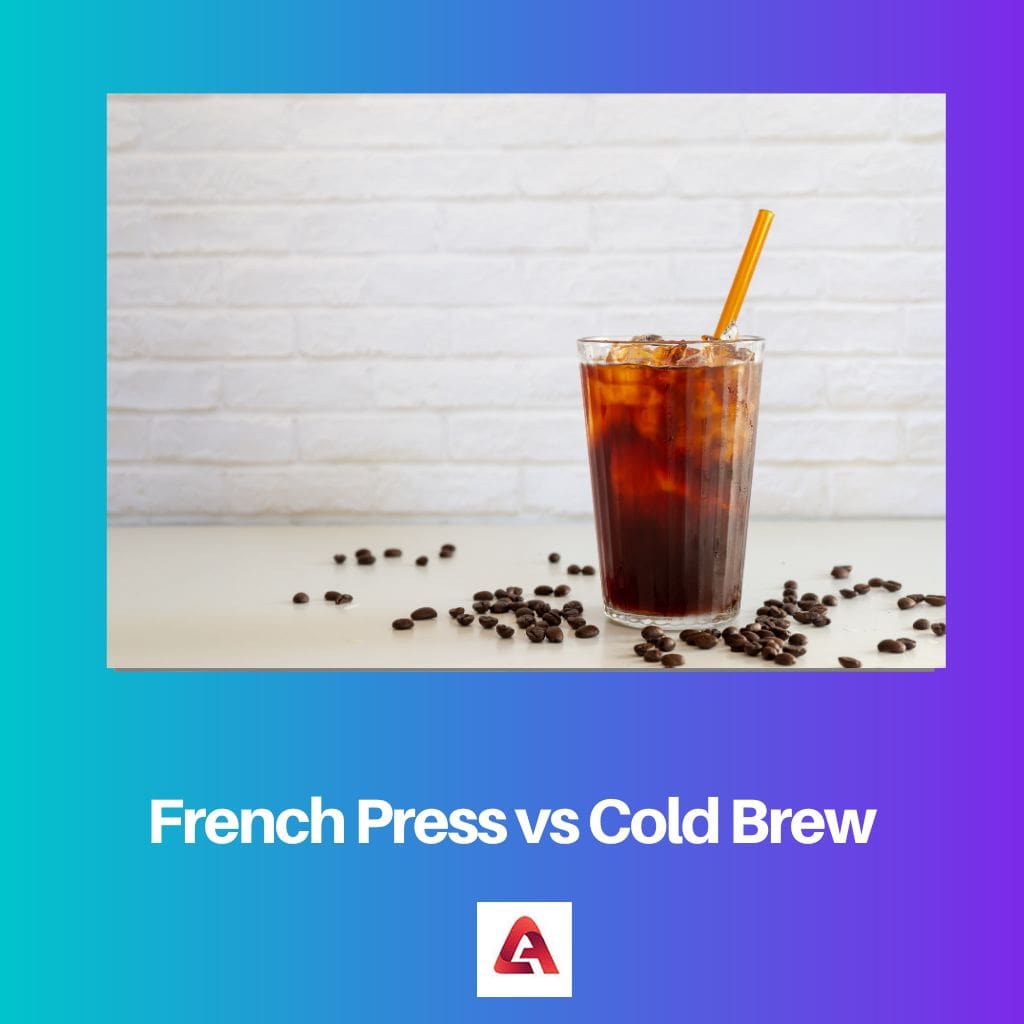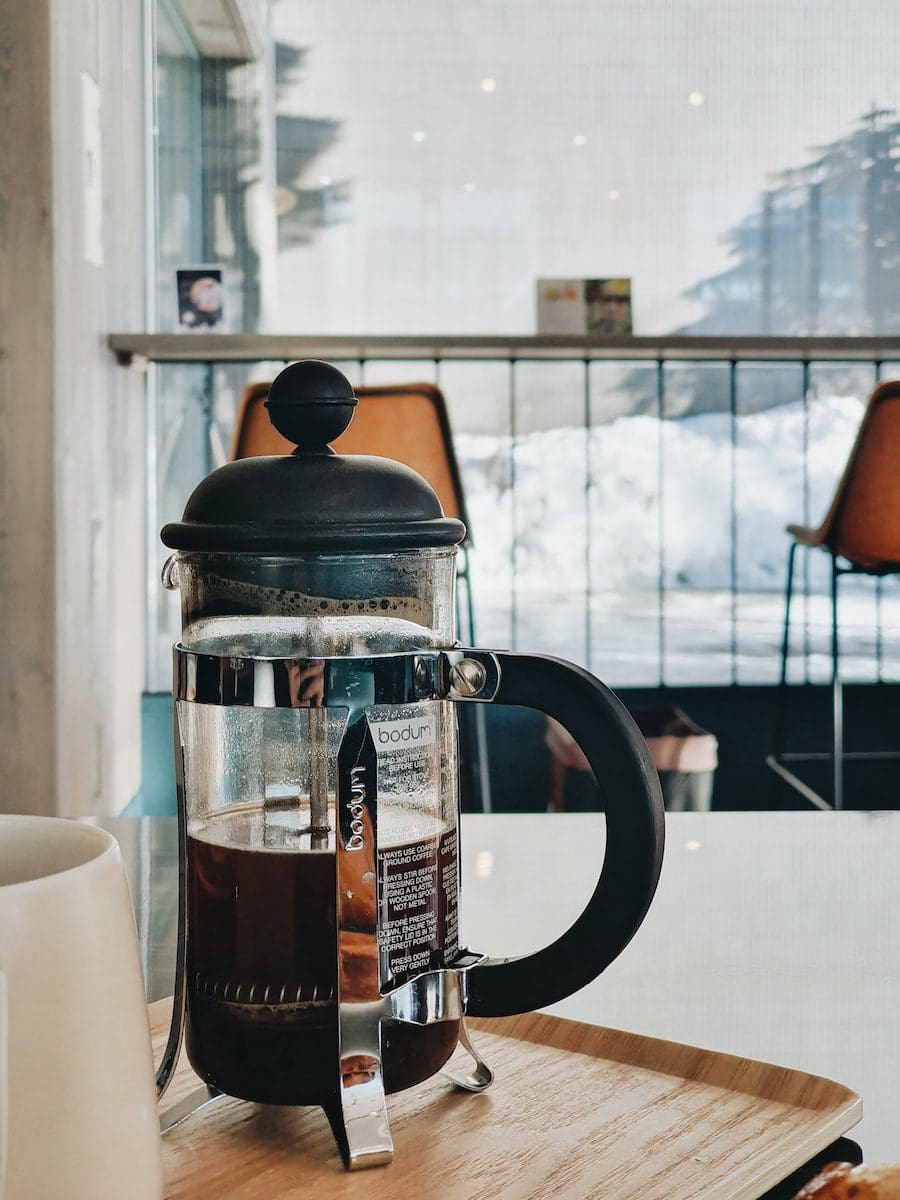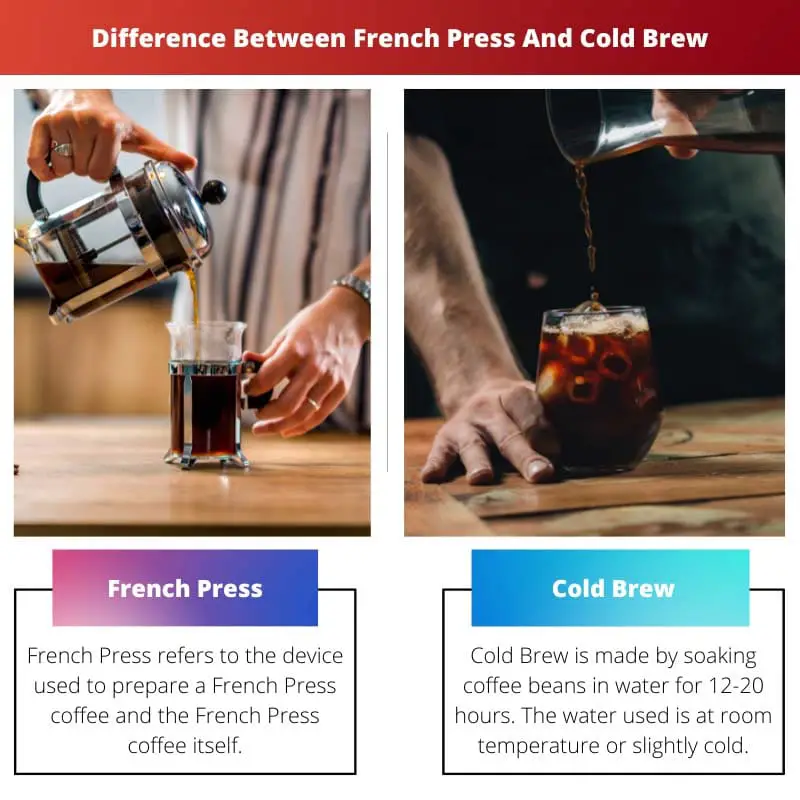Strong coffee is the best way to start a day, and it is better if you want a high-concentration level after midnight. The intense flavors of a strong coffee can provide a fresh mind anytime – be it morning, daytime, evening, or night.
Two of the methods to produce a strong coffee are French Press and Cold Brew.
Key Takeaways
- A French press is a manual coffee brewing method that uses immersion and a plunger to separate coffee grounds from the liquid, producing a full-bodied flavor.
- Cold brew involves steeping coffee grounds in cold or room temperature water for an extended period, resulting in a smooth, less acidic beverage.
- French press coffee is quicker to prepare and tastes richer, while cold brew offers a longer brewing time and a milder, more refreshing flavor.
French Press vs Cold Brew
French press is a hot coffee brewing method that produces a full-bodied and richly flavored coffee. Cold brew is a cold coffee brewing method. It produces a smoother and less acidic coffee concentrate. Cold brew coffee is served over ice, and it can be diluted with water, milk, etc.

French Press refers to the device used to prepare a French Press coffee and the French Press coffee itself. A French Press coffee is prepared in a French Press by immersing coffee seeds in hot water.
After that, the liquid is poured into a cup or any other vessel.
Cold Brew is made by soaking coffee beans in water for 12-20 hours. The water used is at room temperature or slightly cold. When the coffee is immersed for such a long time, its flavors travel into the water completely.
This is the reason why Cold Brews are highly-concentrated.
Comparison Table
| Parameters of Comparison | French Press | Cold Brew |
|---|---|---|
| Method used | Coffee is soaked in hot water | Coffee is soaked in normal water |
| Water temperature | 100-120 C or 200-250 F | 20-25 C or 68-77 F |
| Preparation time | Around 5 minutes | 12-20 hours |
| Equipment(s) needed | A French Press | A long jar; can be prepared in a French Press too |
| Milk used | French Press is made without milk | Milk can be added into a Cold Brew |
| Ice cubes used | No ice cubes are used in a French Press | Ice cubes can be used in a Cold Brew |
| Acid levels (depend upon the beans used) | More acidic than Cold Brew | Less acidic than French Press |
| Caffeine levels (473 ml vessel) | 160mg | 200mg |
| Coffee Beans used | Fresh beans | Both fresh and old (not too old) |
What is French Press?
French Press coffee is a drink prepared using a French Press. In a French Press, coarse coffee beans are immersed in hot water for about 5 minutes and then pushed to the bottom using the plunger and then poured into a vessel.
If the beans are not plunged, they might escape and float in your coffee. A French Press isn’t filtered so the oils remain in the drink giving a bold flavor.
Naturally, a French Press coffee can only be created using a French Press. French Press was developed in 1929 by Attilio Calimani and Giulio Moneta.
However, two Frenchmen Mayer and Delforge patented an early version of the French Press in 1852 but it wasn’t as functional as that of Calimani and Moneta.
When the ground coffee beans are immersed in hot water (100-120 C or 200-250 F), the water gains all the flavors and oils from the beans.
Since no heating is involved, these flavors are preserved and not lost in the process. Also, milk isn’t added to a French Press as it reduces the taste.
All these are the reasons why a French Press has an intense taste and a high concentration than other coffee drinks.

What is Cold Brew?
Cold Brew is a drink prepared by immersing coffee beans in normal water. The beans start to soak and release their flavor which is gained by the water.
This process takes 12-20 hours as it depends hugely on the type of beans used as well as the temperature of the water. The coffee beans used to prepare a Cold Brew must be coarse.
Also, the beans don’t need to be fresh, but they shouldn’t be too old.
It is said that the first Cold Brew coffee was prepared in the city of Kyoto of Japan. The drink was called “Kyoto” and was originated in the 1600s.
Another theory says that the Japanese learned to make Cold Brew from the Dutch traders that traveled from Indonesia.
Essentially, a Cold Brew isn’t a coffee drink but a concentrated caffeine liquid. The user can add milk, ice, water, or other flavors according to their taste to make a more interesting Cold Brew.
The taste of a Cold Brew is commonly defined as a low-acidic, smooth and strong. However, the actual taste of any Cold Brew depends upon the brewing method, the type of beans used, and your creativity.

Main Differences Between French Press And Cold Brew
- French Press is prepared by soaking coffee in hot water (100-120 C or 200-250 F) whereas Cold Brew is prepared by soaking coffee in normal water (20-25 C or 68-77 F).
- French Press can be made in 5 minutes whereas Cold Brew is prepared in 12-20 hours.
- French Press coffee is made in a French Press whereas you need a long jar to prepare Cold Brew.
- French Press is made without milk and ice whereas a Cold Brew can use milk and ice.
- French Press is more acidic than Cold Brew.
- French Press contains 160mg caffeine whereas a Cold Brew contains 200mg caffeine.
- French Press is prepared using fresh coffee beans whereas Cold Brew can be made using old beans.





